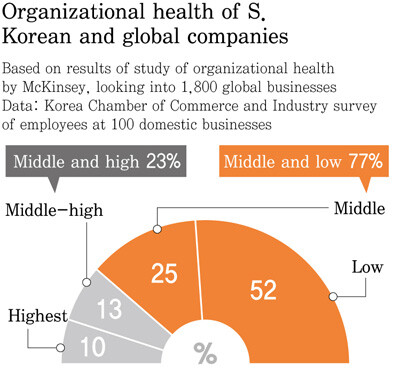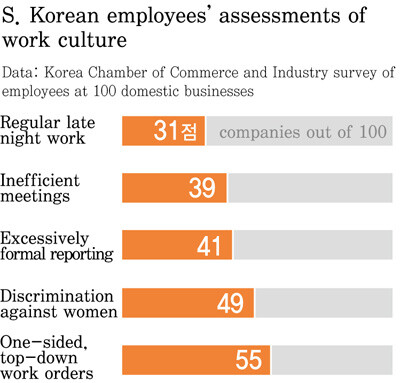hankyoreh
Links to other country sites 다른 나라 사이트 링크
S. Korean businesses plagued by late hours and “irrational” evaluations

Around eight out of every ten South Korean businesses - larger and smaller ones alike - rank toward the bottom for “organizational health” compared to their global counterparts, an analysis shows.
The same analysis also criticized what it called a “regressive” corporate culture characterized by chronic late-night working hours and irrational evaluation systems.
The Korea Chamber of Commerce and Industry (KCCI) published a report on Mar. 15 on the organizational health and corporate culture of South Korean businesses. Its findings were based on a nine-month survey of 40,000 employees at 100 businesses between June 2015 and Feb. 2016, including 69 small businesses and 31 large corporations ranked in the top 500 according to sales.
Conducted in partnership with the global consulting firm McKinsey, the study assessed elements previously found by McKinsey to influence organizational competitiveness for 1,800 global businesses (1.5 million total employees), including leadership, work systems, innovation climate, and allocation of responsibility. Performance was classified into four groups of 25% each - high, middle-high, middle-low, and low - with South Korean businesses compared in terms of their level of achievement.
The results showed 77% of South Korean businesses to rank in the middle-low and low categories globally for organizational health, with 52% falling into the lowest category. In contrast, just 10% were ranked in the highest category, while 13% were classified in the middle-high category.
Mid-sized businesses fared particularly poorly, with 63 out of 69 examined (91%) falling in the lower categories. Interestingly, a clear divide in views was observed between managers, who rated their own company’s organizational health at a high average level of 71 points, and employees, who gave it a low ranking of 53 points.
Just 50% of South Korean businesses were found to have established “sustainable growth DNA” to allow for continued results, compared to 66% of global businesses. In terms of DNA type, 98% of South Korean business were found to have the “execution focus” seen as helpful in catching up quickly with more advanced counterparts, while just 2% were identified as having the “leadership focus,” “market focus,” and “knowledge focus” needed to become fast movers spearheading change and innovation.
In terms of corporate culture, South Korean businesses were characterized as severely regressive, with chronic night overtime, inefficient meetings, a top-down command structure, and irrational evaluation systems. A survey on feelings about corporate culture showed chronic night overtime receiving a low score of 31 points, followed by inefficient meetings (39), excessively formal reporting (41), discrimination against women in assessment and promotions (49), and general work orders (55).

Employees were found to work nights an average of 2.3 times in a five-day week; 43% reported working late three or more days a week. Nearly one out of every ten - 8.9% - reported working late all five days of the week, while just 12.2% reported no night overtime. Reasons cited for night hours included sudden orders issued before employees went home, skewed workloads due to unclear division of labor, and a lack of communication in giving orders.
Regressive organizational culture was also found to be hurting company competitiveness. Productivity for people with chronic night overtime stood at 45%, compared to 57% for ordinary workers - signaling an “overtime paradox” where productivity drops the later workers stay.
While business industry insiders have traditionally cited external factors such as global economic underperformance, anti-corporate sentiment, and excessive government regulations as reasons for weakening company competitiveness, the survey of economic groups suggest that internal factors are actually to blame.
“When you have ailing organizations steeped in regressive, old-fashioned corporate cultures like those of today, it becomes impossible to get through the ’New Normal‘ era of low growth or to improve companies’ social standing,” said KCCI chairman Park Yong-man.
Accordingly, KCCI has made plans for innovations in three areas seen as root causes behind poor corporate culture: unscientific work processes, irrational evaluation systems, and a shortage of leadership capabilities. In particular, it has identified CEOs as holding the key to cultural improvements, with plans to improve organizational “constitutions” through behavior plans.
“There’s only so much you can do to treat the symptoms through things like ’lights out‘ practices to encourage going home on time or maternity leave to make use of talented female workers,” said KCCI director Lee Kyung-sang.
“What we need is a more fundamental approach through things like establishing business principles, optimizing orders and feedback, instilling principles behind the division of tasks, focusing on performance in evaluation and compensation, strengthening leadership capabilities, and establishing and sharing ethics with regard to responsibilities,” Lee added.
Lee also announced plans to pursue a “corporate culture advancement forum” with CEOs representing major South Korean businesses.
By Kwack Jung-soo, business correspondent
Please direct questions or comments to [english@hani.co.kr]

Editorial・opinion
![[Guest essay] The real reason Korea’s new right wants to dub Rhee a founding father [Guest essay] The real reason Korea’s new right wants to dub Rhee a founding father](https://flexible.img.hani.co.kr/flexible/normal/500/300/imgdb/original/2024/0423/8317138574257878.jpg) [Guest essay] The real reason Korea’s new right wants to dub Rhee a founding father
[Guest essay] The real reason Korea’s new right wants to dub Rhee a founding father![[Column] ‘Choson’: Is it time we start referring to N. Korea in its own terms? [Column] ‘Choson’: Is it time we start referring to N. Korea in its own terms?](https://flexible.img.hani.co.kr/flexible/normal/500/300/imgdb/original/2024/0423/3617138579390322.jpg) [Column] ‘Choson’: Is it time we start referring to N. Korea in its own terms?
[Column] ‘Choson’: Is it time we start referring to N. Korea in its own terms?- [Editorial] Japan’s rewriting of history with Korea has gone too far
- [Column] The president’s questionable capacity for dialogue
- [Column] Are chaebol firms just pizza pies for families to divvy up as they please?
- [Column] Has Korea, too, crossed the Rubicon on China?
- [Correspondent’s column] In Japan’s alliance with US, echoes of its past alliances with UK
- [Editorial] Does Yoon think the Korean public is wrong?
- [Editorial] As it bolsters its alliance with US, Japan must be accountable for past
- [Guest essay] Amending the Constitution is Yoon’s key to leaving office in public’s good graces
Most viewed articles
- 1Samsung barricades office as unionized workers strike for better conditions
- 2[Editorial] Japan’s rewriting of history with Korea has gone too far
- 3[Column] The president’s questionable capacity for dialogue
- 4[Reporter’s notebook] Did playing favorites with US, Japan fail to earn Yoon a G7 summit invite?
- 5[Column] The clock is ticking for Korea’s first lady
- 6Korean government’s compromise plan for medical reform swiftly rejected by doctors
- 7[Column] Are chaebol firms just pizza pies for families to divvy up as they please?
- 8Why Korea shouldn’t welcome Japan’s newly beefed up defense cooperation with US
- 9[Column] Has Korea, too, crossed the Rubicon on China?
- 10US overtakes China as Korea’s top export market, prompting trade sanction jitters